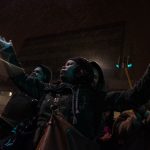Joburg residents fight warrantless raids in court
More than 2 000 inner-city dwellers have challenged the constitutionality of the act that authorises the police to conduct searches of their homes without warrants.
Author:
20 March 2020

President Cyril Ramaphosa advising South Africans to exercise social distancing and avoid big gatherings to help prevent the spread of the coronavirus did not stop a large number of inner-city dwellers from heading to the Johannesburg high court on Monday 15 March.
The occupiers of 11 residential buildings filled the court to challenge the constitutionality of Section 13(7) of the South African Police Service Act 68 of 1995. They say the section is unconstitutional in that it allows the police to search a home without a warrant issued by a magistrate or judge.
The residents came to court wearing white T-shirts bearing messages such as ‘My home is secret’, ‘My home my dignity my privacy’ and ‘We belong’.
Inner City Federation secretary Siyabonga Mahlangu said more people had wanted to come to the courthouse but couldn’t because of the president’s announcement prohibiting gatherings of more than 100 people amid the outbreak of Covid-19, as the coronavirus is formally known. The planned march to the high court didn’t have as many people as planned. The case took place before the judiciary issued a directive limiting the number of people who could attend the court sessions.
Night-time raids
The City of Johannesburg, South African Police Service (SAPS), Johannesburg Metro Police Department (JMPD) and Department of Home Affairs immigration officers conducted about 39 raids at these 11 residential buildings between 30 June 2017 and 3 May 2018, according to court papers.
Socio-Economic Rights Institute of South Africa (Seri) community research and advocacy officer Edward Molopi said “the constitutional challenge pertains to … raids that took place in 11 inner-city buildings”. There were “over 2 000 individual residents affected by the raids and are part of the case”, added Molopi.
The actions of the SAPS, JMPD and home affairs immigration officers were broadly the same in all the buildings. It is alleged that they forced residents out of their homes and on to the streets in the middle of the night, where they searched and fingerprinted them, and demanded that they produce copies of their identity documents and passports.
“Uma uthe ukuba mnyama ngebala, ungowase-South Africa, ungayiphethe ID babek’bopha (If you were a bit dark in complexion but from South Africa and not in possession of your ID, police arrested you),” said Mahlangu. They did this under the auspices of the Immigration Act.
Related article:
While the occupants were outside, it is alleged that SAPS officers broke down their doors and rummaged through their possessions. This was said to have resulted in certain items, including money, being stolen.
No search warrant was ever presented to the residents. The SAPS told them the raids were because they were occupying the building without the consent of the owner or because they were “foreign nationals”, according to Seri’s court papers.
The residents later came to understand that the raids were being conducted under Section 13(7) of the South African Police Service Act, which permits searches in cordoned off areas for purposes of public order or safety. It is for this reason that Seri filed an application of unconstitutionality of the section on behalf of the residents of the 11 properties being subjected to raids.
Unconstitutionality debate
Seri advocate Stuart Wilson told the court that in a number of cases, the Constitutional Court had declared warrantless searches unconstitutional and that the same principle should be applied in the current case. But the three presiding judges said that the facts of the cases on which Seri was relying were different to Section 13(7).
Debate ensued, with Wilson reiterating that the decisions of the Constitutional Court were binding for all courts. Judge Pieter Meyer responded by referring to the purpose and intention of the act, saying there might be extraordinary circumstances that required the police to cordon off a site without possessing a warrant, such as a bomb in an airport. He added that the police have an obligation to uphold law and order and such a provision assists them in ensuring that citizens are safe.
Legal Aid South Africa supported Meyer’s position. The state-funded body had been admitted to the proceedings as a friend of the court. Legal Aid implored the court to be cautious in declaring the section unconstitutional as there may be extraordinary circumstances in which a search without a warrant is necessary.
Related article:
Wilson countered that the applicants are not opposed to the police doing their job, but that the act is too general and broad, and is susceptible to abuse by members of the police. He added that the section cannot be reasonably justified in terms of Section 36 of the Constitution as, based on a literal reading of the section’s language, it violates fundamental rights to privacy and dignity.
Wilson went on to say that there is no logic in raiding the homes of people who are victims of crimes as this is similar to “victim blaming”. He was responding to the state’s argument that the high rate of crime in the area is the reason for the raids and cordons. Wilson added that the police should instead find the people who are committing the crimes and harassing residents.
Wilson said there had been five different raids in one building, none of them with a warrant. Had there been judicial oversight, the raids would not have taken place as their purpose was not in line with the purpose of Section 13(7), which is to restore public order and ensure the safety of the public. The SAPS, JMPD, City of Joburg and home affairs department have ulterior motives, he said.
The state argued that there is nothing wrong with the section, the problem is how officers on duty conduct the raids.
Migrants targeted
The presence of home affairs immigration officers during the raids was unlawful, said Wilson, adding that the department wants to circumvent the law by searching and arresting people without the correct documents.
Lawyers for Human Rights, another friend of the court, agreed. The non-governmental organisation said immigration officers are mandated by Section 33(5) of the Immigration Act to obtain warrants of arrest. Participating in the raid under the auspices of Section 13(7) of the South African Police Service Act is a clear indication of the officers’ intention to bypass the law and target migrants, it said.
The City under former mayor Herman Mashaba had said the raids were to conduct surveys of those living in the inner-city buildings for the purpose of eviction and alternative accommodation. But Wilson said this, too, contradicts the purpose of Section 13(7). The City had no jurisdiction in terms of the act to raid homes and the manner in which it wanted to collect data was unlawful, he said.
Related article:
The raids are at odds with the state’s obligation to progressively realise housing rights, said Wilson, and they violated residents’ rights to meaningful engagement before any eviction process.
“They want to evict poor people and hand over buildings to private developers, without following proper procedure,” said Mahlangu.
Molopi confirmed that almost all the applicants in the case are facing eviction proceedings.
The legal representative for the mayor and City was at pains to explain which provisions of the act gave them jurisdiction to participate in the raids. He told the court that the presence of the JMPD was to assist the police with traffic flow and in cordoning off the area.
Not hijacked buildings
When Judge Dunstan Mlambo referred to the raids taking place to deal with the issue of “hijacked buildings”, Wilson took exception to the term. Categorising these as “hijacked buildings” is “meaningless” and a “pejorative term,” he said, adding that often people who occupy land or buildings are criminalised.
He pointed out the distinction between occupying land or a building unlawfully, and someone who masquerades as an owner and makes people pay rent to live in a building they do not own. Calling people who occupy buildings unlawfully “hijackers” allows law enforcement to act with impunity against impoverished people.
Related article:
Molopi said, “The term ‘building hijacking’ is not useful in describing the vast majority of occupations in the inner city. It is not reflective of the housing situation in the inner city and it wrongly blames poor people for the housing crisis. People live in these buildings unlawfully because the only other option would be to sleep on the street. The term is derogatory and amounts to victim-blaming. Most importantly, it prevents from finding solutions to the housing problem by misdiagnosing the problem.”
The more than 2 000 residents who live in the 11 buildings in different parts of Joburg’s inner city have implored the court to declare the section unconstitutional and grant them constitutional damages for the violation of their right to dignity and privacy. They also want the court to issue an interdict against future warrantless searches and declare the respondents’ raids unlawful.
The court reserved its judgment.




